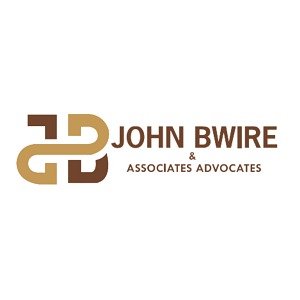Best Financial Services Regulation Lawyers in Kenya
Share your needs with us, get contacted by law firms.
Free. Takes 2 min.
Or refine your search by selecting a city:
List of the best lawyers in Kenya
Legal guides written by Adroit Law LLP:
- Kenya Launches Digital Nomad Visa: A Gateway for Remote Workers
- Navigating the Payment System License Maze in Kenya
- Navigating the Complexities of Mining Licenses and Permits in Kenya: A Look into Artisanal and Large-Scale Operations
About Financial Services Regulation Law in Kenya
Financial Services Regulation in Kenya refers to the legal framework governing the operations of financial institutions within the country. This includes banks, insurance companies, stockbrokers, and other entities involved in providing financial services to the public. The primary objective of financial regulation is to ensure the integrity, transparency, and stability of the financial system, protect consumers, and prevent financial crimes. The Central Bank of Kenya (CBK), the Capital Markets Authority (CMA), the Insurance Regulatory Authority (IRA), and the Retirement Benefits Authority (RBA) are the main regulatory bodies that oversee various sectors within the financial services industry in Kenya.
Why You May Need a Lawyer
There are several situations where you might require legal assistance in Financial Services Regulation in Kenya. Common scenarios include:
- Compliance: Understanding and ensuring adherence to complex regulatory requirements.
- Licensing: Assistance with obtaining necessary licenses or permits to operate a financial services business.
- Dispute Resolution: Handling conflicts or legal challenges involving financial transactions or agreements.
- Corporate Transactions: Guidance on mergers, acquisitions, and other corporate actions within the financial sector.
- Consumer Protection: Representing individuals or entities in cases of financial fraud or malpractice.
- Anti-Money Laundering (AML) and Counter-Terrorism Financing (CTF): Ensuring compliance with AML/CTF laws.
Local Laws Overview
Kenya has a comprehensive legal framework governing financial services, primarily composed of the following key laws:
- The Banking Act: Regulates the licensing, establishment, and operation of banks.
- The Capital Markets Act: Governs the securities and capital markets industry.
- The Insurance Act: Provides a framework for the regulation and supervision of insurance companies.
- The Retirement Benefits Act: Manages the regulation of pension schemes.
- The Microfinance Act: Regulates the establishment and running of microfinance institutions.
- The Financial Markets Conduct Bill: Aims to enhance consumer protection and ensure service integrity.
Frequently Asked Questions
What is the role of the Central Bank of Kenya in regulating financial services?
The Central Bank of Kenya is responsible for formulating and implementing monetary policy, licensing and supervising banks, and ensuring the stability of the financial system.
How can I file a complaint against a financial institution in Kenya?
You can file a complaint through the specific regulatory body responsible for that sector, such as the Central Bank of Kenya, Capital Markets Authority, or Insurance Regulatory Authority, depending on the institution involved.
What constitutes financial misconduct under Kenyan law?
Financial misconduct can include fraudulent financial activities, insider trading, money laundering, non-disclosure of crucial information, and non-compliance with regulatory requirements.
Are there penalties for non-compliance with financial regulations?
Yes, penalties can include fines, suspension of licenses, legal sanctions, and other disciplinary actions as prescribed by the specific regulatory authority.
What are the licensing requirements for new financial service providers?
Licensing requirements vary by sector but generally include submission of a detailed business plan, proof of capital adequacy, and compliance with regulatory standards laid out by the respective authority.
How does the Kenyan government protect consumers in the financial services sector?
The government protects consumers through robust regulations that enforce fair treatment, transparency, and accountability from financial institutions.
What is the importance of Anti-Money Laundering laws in Kenya?
Anti-Money Laundering laws are crucial in preventing illegal financial activities, safeguarding the financial system, and ensuring compliance with international standards.
How does the Insurance Regulatory Authority regulate insurance companies?
The Insurance Regulatory Authority ensures that insurance firms operate within set legal frameworks, maintain proper financial solvency, and meet the claims of policyholders.
What is the role of the Capital Markets Authority?
The Capital Markets Authority regulates the capital markets industry to promote transparency, fairness, and stability in securities trading and investment services.
Can foreign entities operate financial services in Kenya?
Yes, foreign entities can operate in Kenya, but they must comply with local laws and obtain the necessary approvals from Kenyan regulatory bodies.
Additional Resources
For more information and assistance, the following resources and organizations can be helpful:
- Central Bank of Kenya (CBK)
- Capital Markets Authority (CMA)
- Insurance Regulatory Authority (IRA)
- Retirement Benefits Authority (RBA)
- Kenya Bankers Association (KBA)
- Financial Sector Regulators Forum (FSRF)
Next Steps
If you need legal assistance in Financial Services Regulation, consider the following steps:
- Identify the specific area or issue that needs legal attention.
- Consult with a legal professional or law firm specializing in financial services regulation.
- Ensure you have all necessary documentation and information related to your case or situation.
- Discuss the potential outcomes and implications of your legal options with your lawyer.
- Follow the legal advice and recommended actions provided by your lawyer to address your concerns effectively.
Lawzana helps you find the best lawyers and law firms in Kenya through a curated and pre-screened list of qualified legal professionals. Our platform offers rankings and detailed profiles of attorneys and law firms, allowing you to compare based on practice areas, including Financial Services Regulation, experience, and client feedback.
Each profile includes a description of the firm's areas of practice, client reviews, team members and partners, year of establishment, spoken languages, office locations, contact information, social media presence, and any published articles or resources. Most firms on our platform speak English and are experienced in both local and international legal matters.
Get a quote from top-rated law firms in Kenya — quickly, securely, and without unnecessary hassle.
Disclaimer:
The information provided on this page is for general informational purposes only and does not constitute legal advice. While we strive to ensure the accuracy and relevance of the content, legal information may change over time, and interpretations of the law can vary. You should always consult with a qualified legal professional for advice specific to your situation.
We disclaim all liability for actions taken or not taken based on the content of this page. If you believe any information is incorrect or outdated, please contact us, and we will review and update it where appropriate.
Browse financial services regulation law firms by city in Kenya
Refine your search by selecting a city.

















